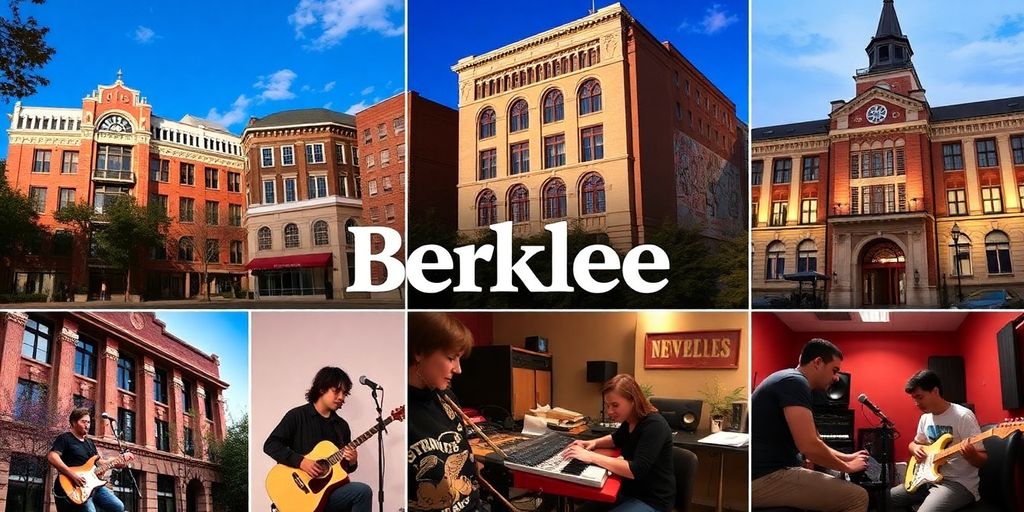
Berklee University of Music has carved a unique niche in the world of music education since its inception. Founded in the mid-20th century, it has become a hub for aspiring musicians and industry professionals alike. With a focus on contemporary music and innovative teaching methods, Berklee has not only shaped the careers of countless artists but has also influenced the music landscape globally. This article explores the rich history, innovative programs, and the diverse community that makes Berklee a standout institution in the world of music education.
Key Takeaways
- Berklee University of Music started as Schillinger House in 1945, focusing on jazz education.
- The school has evolved to include contemporary music studies and technology in its curriculum.
- Notable alumni include Grammy winners and influential figures in various music genres.
- Berklee is committed to diversity, offering inclusive education and support for underrepresented artists.
- The university has a global presence with campuses and collaborations around the world.
Historical Significance of Berklee University of Music

Founding and Early Years
So, Berklee, right? It didn’t just pop up out of nowhere. Back in 1945, Lawrence Berk had this idea. He bought a building on Newbury Street and started a music school. Get this – he named it Schillinger House, after his mentor. Can you imagine? It was a pretty big deal because it was the first place that actually focused on jazz. Lawrence Berk’s early vision was pretty groundbreaking.
Evolution of Music Education
Berklee didn’t stay the same, that’s for sure. It changed with the times. They started adding all sorts of programs, not just jazz. Rock, pop, film scoring – you name it. They were always trying new things and figuring out what musicians actually needed to learn to make it in the real world. It’s not just about theory; it’s about actually playing and creating.
Influence on Jazz and Popular Music
Okay, so Berklee’s impact is huge. Think about all the musicians who went there and then went on to do amazing things. They helped shape jazz and popular music. It’s not just about individual stars, either. Berklee influenced how music is taught and how musicians think about their craft.
Berklee’s influence extends beyond just its alumni. The university has shaped music education globally, influencing curricula and teaching methods in countless institutions. This impact is a testament to Berklee’s commitment to innovation and its dedication to preparing musicians for the ever-evolving music industry.
Innovative Programs and Curriculum
Berklee isn’t just about tradition; it’s a place where music education constantly evolves. They’re always trying new things to keep up with the ever-changing music world. It’s pretty cool, actually.
Contemporary Music Studies
Berklee’s approach to contemporary music is pretty interesting. They don’t just stick to the classics; they embrace all sorts of modern genres. You can study everything from pop and rock to hip-hop and electronic music. They really want you to find your own voice and style.
- Focus on current industry trends
- Emphasis on songwriting and production
- Performance opportunities in diverse genres
Technology in Music Education
Okay, so Berklee is serious about tech. They know that music production is all digital now, so they make sure everyone is up to speed. Students get hands-on experience with all the latest software and hardware. Incoming students are even required to use Logic Pro X for their core studies. It’s like they’re preparing you for the future of music, which is pretty smart.
I remember when I first started learning music production, it was all about analog equipment. Now, everything is done on a computer. It’s amazing how far technology has come, and Berklee is definitely at the forefront of this change.
Global Music Perspectives
Berklee isn’t just focused on American music; they have a huge global outlook. They offer courses in world music traditions, and they encourage students to collaborate with musicians from all over the globe. It’s all about breaking down barriers and creating music that reflects the world we live in. They also have cultural exchange programs to help students experience music from different cultures firsthand.
- Exploration of diverse musical traditions
- Opportunities for international collaboration
- Focus on cultural sensitivity and understanding
Notable Alumni and Their Impact
Berklee’s influence isn’t just about its curriculum; it’s also about the people who’ve walked its halls. The university boasts a remarkable roster of alumni who have shaped the music industry and popular culture. From Grammy winners to influential composers, Berklee grads are everywhere.
Grammy Award Winners
It’s almost easier to list the music genres Berklee alumni haven’t conquered. You’ve got jazz legends, pop icons, film score masters – the whole spectrum. The sheer number of Grammy Awards won by Berklee alumni is staggering. It shows the school’s ability to nurture talent across different styles. Brian Kennedy ’93, a four-time Grammy Award–winning pianist, is just one example of the impact on music that Berklee alumni have had.
Influential Composers and Producers
Beyond performing, Berklee alumni are crafting the sounds we hear every day. They’re composing music for film, television, and video games, and producing hit records for some of the biggest names in the business. Their work often goes unnoticed by the general public, but their influence is undeniable. They are the behind-the-scenes architects of modern music. Take Jon Batiste, a summer program alumnus, who arranged "Space Maker" for Pixar’s Soul.
Cultural Icons in Music
Some Berklee alumni transcend genre and become cultural icons. These are the artists whose music defines generations and whose influence extends far beyond the music industry. They become symbols of creativity, innovation, and artistic expression. They are the faces and voices that inspire millions.
Berklee’s legacy is intertwined with the success of its alumni. Their achievements reflect the school’s commitment to fostering talent and pushing the boundaries of music. It’s a cycle of inspiration, where each generation of alumni builds upon the foundation laid by those who came before.
Berklee’s Commitment to Diversity

Berklee understands that music thrives when different voices come together. It’s not just about ticking boxes; it’s about creating an environment where everyone feels they belong and can bring their full selves to their art. They’re actively working to make sure their community reflects the diverse world of music.
Inclusive Music Education
Berklee is trying to make music education accessible to everyone, no matter their background. They’re doing this by:
- Offering a range of scholarships and financial aid options to help students from all economic backgrounds afford tuition.
- Creating programs that support students from underrepresented groups, giving them the resources and mentorship they need to succeed. For example, The Black Scholars Initiative is a great program.
- Incorporating diverse musical styles and perspectives into the curriculum, so students learn about music from around the world.
It’s about more than just admitting a diverse group of students. It’s about creating a culture of belonging where everyone feels valued and respected.
Outreach Programs
Berklee doesn’t just focus on its students; it also reaches out to the wider community. These outreach programs aim to:
- Provide music education to young people in underserved communities, giving them opportunities they might not otherwise have.
- Partner with local schools and organizations to offer workshops, concerts, and other musical experiences.
- Create pathways for talented young musicians from diverse backgrounds to pursue higher education in music.
Support for Underrepresented Artists
Berklee actively supports artists from underrepresented groups through a variety of initiatives. This includes:
- Providing performance opportunities for emerging artists from diverse backgrounds.
- Offering mentorship and networking programs to help these artists build their careers.
- Creating platforms for these artists to share their stories and connect with audiences around the world.
It’s a continuous effort, but Berklee is making strides in creating a more inclusive and equitable music world. They are also working on their Diversity Values Statement.
Berklee’s Global Presence
International Campuses
Berklee isn’t just confined to Boston; it’s got a real global footprint. The Valencia campus in Spain is a big deal, offering master’s programs and study abroad options. It’s a hub for students from all over the world to come together and learn about music in a different cultural context. It’s not just about replicating the Boston experience; it’s about creating something new and unique that reflects the city and the students who study there. I think that global learning is a great opportunity for students.
Collaborations with Global Artists
Berklee actively seeks out partnerships with artists from around the globe. These collaborations can take many forms, from masterclasses and workshops to joint performances and recording projects. It’s a way for students to learn directly from established musicians who bring different perspectives and styles to the table. It also helps to broaden the students’ understanding of music as a global language and a force for cultural exchange.
Cultural Exchange Programs
Berklee runs a bunch of cultural exchange programs that allow students to immerse themselves in different musical traditions. These programs might involve studying abroad, participating in international festivals, or working with local musicians in other countries. The idea is to give students firsthand experience with different musical cultures and to help them develop a deeper appreciation for the diversity of musical expression around the world. It’s about breaking down barriers and building bridges through music.
I think it’s really cool that Berklee is making an effort to connect with the world. It’s not just about being a great music school in Boston; it’s about being a global center for music education and cultural exchange. It’s important for musicians to be aware of different musical traditions and to be able to collaborate with artists from all over the world. It makes the music better.
Awards and Recognitions
Accolades in Music Education
Berklee isn’t just about the music; it’s about the teaching too. The school has picked up a bunch of awards over the years that show how good it is at music education. It’s not just about churning out stars, but also about having a solid curriculum and great teachers. I think that’s pretty cool, because you can have all the talent in the world, but without good guidance, it’s hard to really make it.
Industry Partnerships
Berklee works with a lot of different companies and organizations in the music industry. These partnerships can mean more opportunities for students, like internships or even jobs after graduation. It’s a smart move, because it keeps the school connected to what’s actually happening in the real world of music. These industry partnerships help students get their foot in the door.
Community Contributions
Berklee’s impact goes beyond just the school itself. They do a lot of stuff to help the community, like offering free music lessons or putting on concerts for local people. It’s cool to see a school that cares about giving back and making music accessible to everyone.
Berklee’s commitment to community engagement is evident through its various outreach programs. These initiatives not only provide access to music education for underserved populations but also enrich the cultural landscape of the surrounding areas. By fostering a love for music and the arts, Berklee contributes to the overall well-being and vibrancy of the communities it serves.
Here’s a quick look at some of the ways Berklee contributes:
- Free workshops for local schools
- Scholarships for talented students from low-income backgrounds
- Community concerts and performances
Future Directions and Innovations
Emerging Trends in Music
Okay, so what’s next for music? It’s a wild question, but Berklee is trying to stay ahead. One thing’s for sure: music creation is changing fast. We’re seeing more artists blend genres, experiment with sounds, and use tech in ways we never imagined. Think AI-assisted composition, virtual reality concerts, and interactive music experiences. It’s not just about writing a song anymore; it’s about building a whole world around it. Berklee is looking at how to prepare students for this new landscape, focusing on adaptability and creative problem-solving. It’s a bit like teaching someone to surf when the waves are constantly changing – you need to be ready for anything. The school is also trying to figure out how to help students become creative entrepreneurs in this evolving space.
Sustainability in Music Education
Sustainability isn’t just about the environment; it’s also about the longevity of a musician’s career and the music industry itself. How do we make sure artists can thrive without burning out? How do we create a music ecosystem that’s fair and equitable? These are tough questions, but Berklee is starting to address them. They’re looking at things like:
- Financial literacy for musicians
- Mental health resources
- Sustainable touring practices
- Ethical music licensing
It’s about building a system where artists can create great music without sacrificing their well-being or contributing to harmful practices. It’s a long game, but it’s essential for the future of music.
Adapting to Digital Landscapes
The digital world is both a blessing and a curse for musicians. On one hand, it offers unprecedented opportunities for distribution and connection. On the other, it’s a crowded and competitive space where it’s hard to stand out. Berklee is working on ways to help students navigate the digital landscape. This includes:
- Mastering digital marketing and social media
- Understanding data analytics and audience engagement
- Exploring new revenue streams like NFTs and streaming platforms
| Platform | Potential Benefit |
|---|---|
| TikTok | Viral reach, short-form content promotion |
| Patreon | Direct fan support, recurring revenue |
| Bandcamp | Artist-friendly sales, community building |
It’s not just about being online; it’s about being smart online. The goal is to equip students with the skills they need to build a sustainable career in the digital age. It’s a constant learning process, but it’s crucial for success in today’s music industry.
Final Thoughts on Berklee’s Impact
Berklee College of Music has really made its mark on the music world. From its beginnings in 1945 to now, it’s been a place where creativity thrives. Students from all over come to learn and grow, and many go on to do amazing things in music. The school has always pushed boundaries, encouraging everyone to not just study music but to create it. It’s clear that Berklee isn’t just about the past; it’s shaping the future of music too. As we look ahead, it’s exciting to think about what new sounds and ideas will come from this vibrant community.
Frequently Asked Questions
What is Berklee College of Music known for?
Berklee College of Music is famous for its focus on contemporary music and jazz. It offers programs that help students learn about music production, songwriting, and performance.
When was Berklee founded?
Berklee was founded in 1945 by Lawrence Berk as Schillinger House. It was later renamed Berklee College of Music.
What types of programs does Berklee offer?
Berklee offers a variety of programs, including degrees in music performance, music business, music production, and music therapy.
Who are some famous alumni from Berklee?
Berklee has many notable alumni, including Grammy winners like John Mayer, Quincy Jones, and Esperanza Spalding.
How does Berklee support diversity in music?
Berklee is committed to diversity by offering inclusive music education and outreach programs that support underrepresented artists.
Does Berklee have campuses outside of the U.S.?
Yes, Berklee has international campuses in places like Valencia, Spain, and also offers online programs to reach students worldwide.








